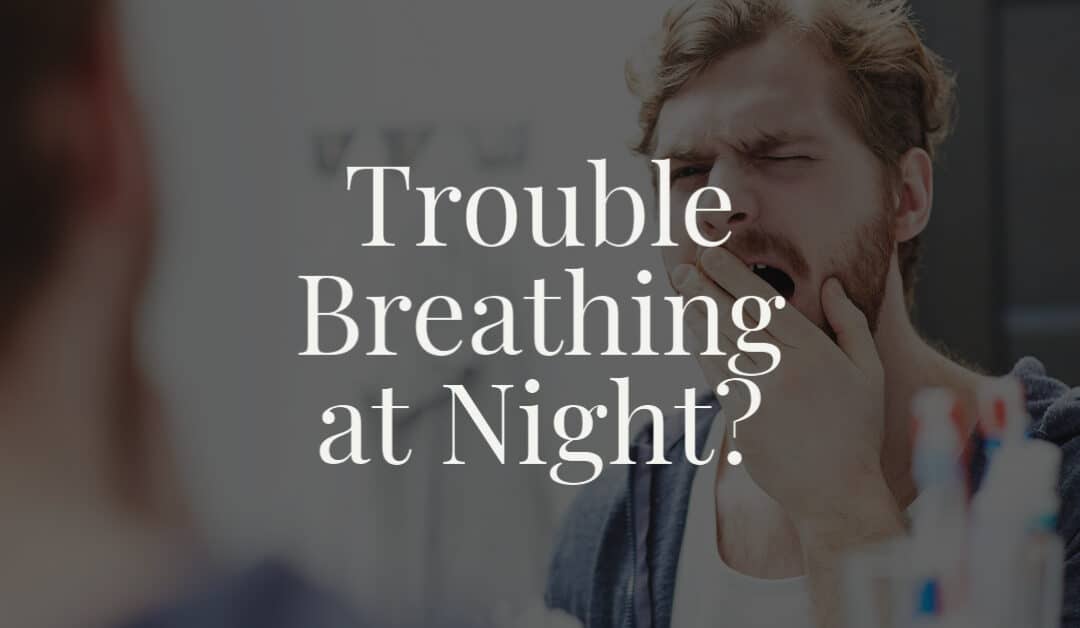If you struggle to breathe at night, you are not alone. Sleepapnea.org estimates that “22 million Americans suffer from sleep apnea, with 80 percent of moderate and severe obstructive sleep apnea cases undiagnosed.” Struggling to breathe at night is not a minor problem. Difficulty breathing while sleeping can cause health problems and even death. Learn why you may struggle to breathe at night due to various health conditions and how to find solutions.
Sleep Apnea is Common
If you struggle to breathe, it is crucial to see your ENT doctor for solutions to this sleep disorder. The majority of those who suffer from breathing problems while sleeping suffer from obstructive sleep apnea. This medical condition often shows up in symptoms such as:
- Snoring
- Waking and gasping for breath
- Fatigue during the day
- Waking up tired
- Waking up frequently throughout the night
What Can I Do About Sleep Apnea? Understanding Risk Factors
When obstructive sleep apnea is the culprit, and you don’t find a solution, you can face:
- High blood pressure
- Daytime sleepiness leading to accidents
- Heart failure or other cardiovascular complications such as atrial fibrillation
- Stroke
- Type 2 diabetes
- Depression
Addressing risk factors such as obesity and heart disease can significantly improve sleep apnea symptoms.
It is vital to get treatment for sleep apnea. If you think you might struggle with sleep apnea, you can see your ENT doctor to schedule a sleep study and find out more. A sleep study can diagnose all types of sleep disorders which your doctor can then treat. With gold-standard devices available and new solutions for sleep apnea coming out, your doctor can help.
The 2 Other Types of Obstructive Sleep Apnea
Two other types of sleep apnea are equally dangerous. Central sleep apnea happens when your brain does not communicate with your breathing muscles and your body “forgets” to breathe. This type of sleep apnea is just as dangerous as obstructive sleep apnea and causes the same symptoms if left untreated.
Patients with central sleep apnea may also experience paroxysmal nocturnal dyspnea, a sudden shortness of breath that wakes them up at night.
You can also suffer from complex sleep apnea, a combination diagnosis: obstructive sleep apnea AND central sleep apnea. Seeing your doctor can help you find new solutions for sleep apnea. CPAP, APAP, and BiPAP machines all treat sleep apnea, but more recent solutions include Inspire. A minor procedure implants Inspire, a small FDA-approved device. At night, you turn on Inspire with a remote control. This device treats obstructive sleep apnea without the fuss of wearing a mask at night.
Other Possible Conditions
There are many conditions that can cause trouble breathing at night. However, some are more common than others.
Other serious health conditions that can cause trouble breathing at night include congestive heart failure and coronary artery disease. Individuals with excess weight are also at higher risk for respiratory issues and heart disease, which can exacerbate breathing difficulties during sleep.
Other common conditions that can cause trouble breathing include:
Iron Deficiency Anemia
According to NBIHealth, iron deficiency can be an underlying cause for:
- Anxiety
- Shortness of breath
- Burning, tingling, or discomfort in the legs—symptoms often diagnosed as restless leg syndrome or RLS
- Cloudy thinking
- Depression
- Dizziness
- Fatigue
- Feeling cold
- Hair loss
- Rapid heart rate
Panic or Anxiety Disorders
These disorders often benefit from learning how to change your focus. Ruminating on catastrophic possibilities can bring more anxiety and panic. Learn how to calm your racing thoughts by focusing on what is happening around you in real-time or practicing gratefulness.
You can focus using meditation, prayer, mindfulness, or a good book or audio sleep story. If your struggle is severe enough to prevent sleep altogether or causes significant breathing issues, see a doctor or psychiatrist for medical solutions. In addition, consider seeing a counselor who can help you find out why you struggle with anxiety and talk through issues that may be causing your brain to race out of control.
Respiratory Infections and Difficulty Breathing
Sometimes, you may struggle to breathe at night due to a lung infection or sinus infection. You may not realize that you have pneumonia, a type of lung infection, causing you to feel lethargic and struggle to breathe. According to Lung.org, you could have pneumonia if your symptoms include:
- Cough, which may produce greenish, yellow, or even bloody mucus.
- Fever, sweating, and chills.
- Shortness of breath.
- Rapid, shallow breathing.
- Sharp or stabbing chest pain that gets worse when you breathe deeply or cough.
- Loss of appetite, low energy, and fatigue.
Chronic Obstructive Pulmonary Disease (COPD)
You may struggle with COPD if you have symptoms that include:
- Breathing difficulty
- Cough
- Coughing up mucus
- Wheezing
Often, if you already suffer from emphysema and chronic bronchitis, you may also suffer from COPD. This condition happens when the bronchial tube linings become inflamed. These tubes carry oxygen to your lungs.
We Can Help
If you struggle with breathing difficulties at night and don’t know why, we can help. Our experienced ENT doctors specialize in sleep disorders. Our state-of-the-art sleep center enables us to see your problem and find solutions that work for your unique struggles. Whether you suffer from sleep apnea, an infection, or an inflammatory issue, we find the answers you need to get your ZZZ’s again. Contact us today and find out how we can help you.

